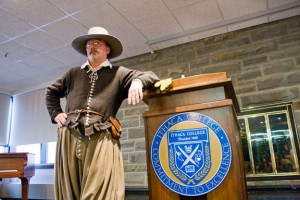Dressed in authentic pilgrim attire including stockings, a hat made of wool and a vest laced with pewter buttons, Buddy Tripp, senior lead interpreter and museum teacher at Plimoth Plantation in Plymouth, Mass., spoke Monday in Clark Lounge as both himself and his pilgrim character from the 1600s — Father Stephen Hopkins.

Plimoth Plantation reenacts a village from 1627 with every historic detail accounted for — from clothing to timber-framed housing to gardens and livestock.
The plantation transformed from a traditional museum into a first person interpretation as an alternative way for people to experience history.
The actors working in the village aim to fully immerse visitors in a 1600s environment. The plantation is full of characters, such as Hopkins, to interpret the history of pilgrims through acting.
“It’s an odd way of teaching history but it works,” Tripp said. “People really forget that they live in the 21st century while they are there.”
Tripp said most people don’t know about pilgrim life as Plimoth Plantation portrays it because it isn’t written about in history books. The actors portray everyday life for a pilgrim as well as lesser-known facts about things such as diseases and politics of the time.
“There is an idealized vision of what they were,” Tripp said. “We want to get rid of that mythos.”
Vivian Bruce Conger, assistant professor and chair of the history department, wanted Tripp to speak at the college for the honors seminar: Power and the Fate of Republics. The seminar focuses on reacting to the past, role-playing and assuming a character from the 1600s.
Conger wanted students to understand what it means to fully understand a historical character as Plimoth Plantation accomplishes. Conger said there is academic merit to immersion into a character from the past to become a primary source of the time. They research their character and interpret their lives through the worldview at the time.
“If you’re not English or a man, you’re a second-class citizen in that time.” Tripp said.
Junior Craig Flickinger attended the event as part of the honors seminar. Flickinger said he was impressed by Tripp’s ability to not break character for such a long amount of time until he took his hat off, which symbolized his transition back to himself.
“You make a connection with a role, and it lasts with you longer,” Flickinger said. “It’s an acting experiment.”
Tripp said it is an experiment of combining acting and history because it is not possible to know all of the information about the characters’ personal lives and how they were at the time. Tripp said he improvises and makes up names for grandparents and children that weren’t known in order to stay in character but doesn’t let it take away from the more important accuracy of information and events.
“It’s where history comes alive,” Tripp said. “It creates a complete immersion into history.”







